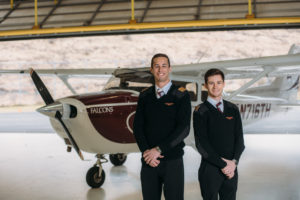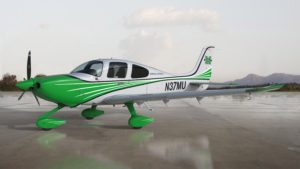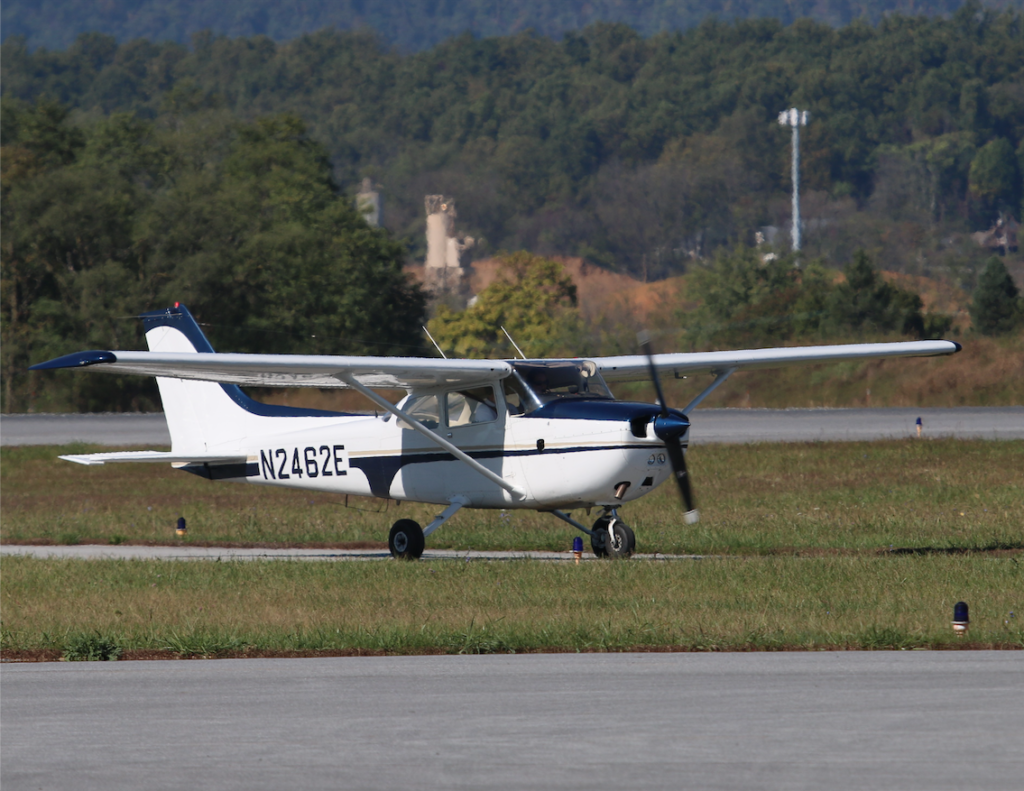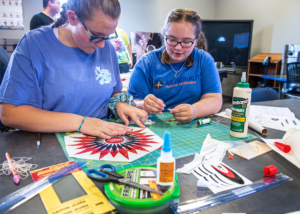By Olivia Miller

A nationwide shortage of trained pilots and aviation technicians has led to a surge of development in aerospace education in West Virginia. According to a recent report by the Federal Aviation Administration (FAA), over the past three decades, the number of pilots in the nation has decreased by 30% while the airline industry has simultaneously seen a tremendous increase in the demand for air travel.
Recognizing this problem as an opportunity, universities, colleges and airports in West Virginia have focused their attention and resources on aerospace education and development in the Mountain State to provide a new workforce for this growing industry.
Fairmont State University’s Aviation Center of Excellence

When Joel Kirk, chief pilot and director of Fairmont State University’s Aviation Center of Excellence, took over the state of West Virginia’s first aviation program in 2017, there were only six students. In three years, Kirk and his staff have turned the aviation center into a highly respected and successful program with 40 current students and countless others on the waitlist vying to be a part of it.
“I expected a lot of students to bail due to the pandemic, but I have more kids now than I’ve ever had,” says Kirk. “It’s been a remarkable run. The bad part is that I don’t have the ability to train all the kids who want to do it.”
The only FAA-approved CFR Part 141 program in the state, students can choose between three tracks offered through the aviation center. Those admitted to the highly selective programs have the opportunity to earn a bachelor’s degree in aviation technology with an emphasis on business administration while simultaneously completing the flight hours and training required to obtain their private, instrument and commercial ratings or choose the professional flight degree option. The aviation management degree option prepares students for careers in airport management, air traffic control, airline management positions and airport security.
Co-located at the North Central West Virginia Airport in Bridgeport, WV, students enrolled in the program will collectively spend more than 5,000 hours in flight each year. The aviation center prides itself on having a small school environment where students receive one-on-one instruction and detailed attention with each flight instructor.
“If I was the chief at a larger school, I probably wouldn’t know every student, but here, I know their records and how they are all doing on a regular basis,” says Kirk.
In the coming years, Kirk has his eyes set on expanding the current facilities on Fairmont’s campus to allow for more students with hopes of buying an upgraded airplane simulator and purchasing more aircraft to add to the current six-airplane fleet.
“It has been an exciting adventure for us, and we’re right on the cusp of really becoming a stabilized flight training center,” he says.
Marshall University’s Bill Noe Flight School

In early August, Marshall University broke ground at Yeager Airport in Charleston, WV, for facilities that will house its newly established Bill Noe Flight School. When in full operation, the flight school is expected to enroll more than 200 students and produce 40 commercial pilots each year.
The classroom facility and 12,000-square-foot hangar, which will hold the school’s new fleet of three Cirrus SR20 single-engine airplanes, will be open for the fall 2021 semester. Currently, the university is in the process of applying for FAA certification to start a Part 141 pilot school that will offer two academic degree programs to prepare students for careers in the aviation industry.
“The need for highly qualified technicians is incredible, and the demand for commercial pilots is even larger,” says David Pittenger, director of the division of aviation at Marshall. “Right now, because of mandatory retirement age and the increase in commercial and cargo travel, airlines need more trained pilots. What we are seeing is that in both programs, schools are actually having to turn away prospective students because they cannot meet the demand.”
The school plans to offer a commercial pilot bachelor’s degree and is also planning a two-year aviation maintenance degree program in partnership with Mountwest Community & Technical College to be located at the Huntington Tri-State Airport. The collaboration between Marshall and Mountwest will be the first of its kind in the state, and students completing
the program will earn a diploma from both schools.
Candidates for the flight school include high school graduates, veterans and adults seeking a career change. Its ground and flight courses will lead to a series of FAA certifications and will prepare graduates to become commercial pilots of single- and multi-engine aircraft.
“From my perspective, one of the most important things to emphasize is that this represents Marshall’s commitment to the betterment of West Virginia’s economy,” says Pittenger. “There are a lot of opportunities here, and we really want to see growth for our neighbors.”
RCBI AERO
The Robert C. Byrd Institute (RCBI), an advanced manufacturing technology
center at Marshall University, offers a comprehensive suite of resources to support economic development and growth across the Mid-Atlantic region. A core thrust of that economic development has been the focus on the aviation industry in West Virginia and the tri-state area. In 2017, RCBI received the first U.S. Economic Development Administration i6 Regional Innovation Strategies grant in West Virginia to establish RCBI AERO, an aerospace proof-of-concept and training facility.
Today, RCBI AERO has the tools and resources to help companies achieve their goals in aviation manufacturing or flight. In addition, RCBI AERO has served in a critical role in the FAA certification process for Marshall’s Bill Noe Flight School.
“Marshall’s investment in this program has led to the development of some really important partnerships with aviation industry companies that are looking to expand their workforce,” says James Smith, director of RCBI AERO. “We’ve had an opportunity to talk to these companies and let them know what our region has to offer because of this process that Marshall has put so much faith in. It has opened a lot of doors and promises to be very beneficial.”
RCBI also offers a machinist technology program that allows students to
receive specialty certifications to prepare them for work in the aerospace industry. The National Institute for Metalworking Skills-accredited program offers courses available to high school graduates, dislocated workers, welfare-to-work participants, employed individuals, in-state or privately funded education or training programs and employers who are expanding the technical capabilities of their current workforce.
“Having this facility allows us to address a need for an industry that is currently hurting for workforce and provide our local communities with a new avenue of education and a new discipline for companies to draw from,” says Smith. “We are giving the industry the best candidates we can possible give in an area of the country that has phenomenal skill sets.”
Robert C. Byrd National Aerospace Education Center
The Robert C. Byrd National Aerospace Education Center is a component of Fairmont State University and Pierpont Community & Technical College. Housed at the Mid-Atlantic Aerospace Complex in Bridgeport, WV, it offers students a quick pathway for lucrative careers in the field of aviation.
Those interested can earn an FAA-certified, two-year associate degree in aviation maintenance technology from Pierpont—the only one of its kind in the state. A recent articulation agreement signed by the center with Southern Illinois University (SIU) will enable students to receive their aviation maintenance technology degree at Pierpont and, after completion, attend SIU’s online aviation maintenance management associate degree program.
“We do all of our own testing here for the students,” says Director Brad Gilbert. “A student can come in here without knowing anything about airplanes, and we can get them certified right here in house.”
With the help of a grant from the Appalachian Regional Commission, the center was able to upgrade its fleet by purchasing a Beechjet, King Air, Cessna 182 retractable gear and Cessna 172 retractable gear. With the purchase of the Beechjet, the center was able to develop a special avionics certificate program to ensure students are up to date on the latest aircraft technology. The center now boasts more than 15 airplanes to train its students.
“It’s been a really exciting year,” says Gilbert. “We signed the articulation agreement and just signed two memorandums of understanding with Harrison and Taylor county schools so high school students can begin taking classes here their junior year. We think enrollments are going to continue to grow, and if we have more space in the future, we can be even more flexible.”
For this academic year, the program has 100 students enrolled, the most in the school’s history. In the future, center leadership hopes to double the size of its current hangar to store its fleet. Gilbert says the addition of new facilities will allow the center to increase its enrollment numbers by 50%.
Bravo Flight Training

By Olivia Miller
After the Eastern West Virginia Regional Airport (MRB) in Martinsburg, WV, acquired its fixed-based operator—the organization that provides aeronautical services to the airport—the airport seized the opportunity to outsource the flight school component to a group that could focus on the growth of the operation. While MRB took over the fueling operation, maintenance shop and charter service, leadership was eager to bring a flight school to the airport to spark more activity.
“Bravo Flight Training was one of several flight schools we talked to about coming to MRB,” says Nicolas Diehl, MRB’s executive director and CEO. “We were ultimately impressed with Bravo’s drive and growth potential. We were looking for a flight school that could be flexible and will grow with us.”
Bravo Flight Training, headquartered in Frederick, MD, has additional locations in Gaithersburg, MD, and now Martinsburg. The school has won multiple industry awards for customer experience and offers training for both social and educational activities that allow students to learn from one another while also networking with other pilots and professionals within the aviation industry. In 2018, the school was recognized for its high standard of accomplishment in flight training by the Aircraft Owners and Pilots Association, the world’s largest aviation association. Bravo Flight Training School will offer training programs in private pilot, instrument rating, commercial, certified flight instructor, sport, Part 141 and multi. Bravo has opportunities for everyone from the novice to the experienced pilot.
“As the aviation industry continues to grow at our airport, more pilots will be essential to the equation,” says Diehl. “Labor underscores the strong need for a flight school at MRB. With access to more trained pilots, aeronautic businesses will find MRB more attractive as a new or expanding location.”
Inspiring Future STEM Leaders

By Kevin Jones
West Virginia State University’s (WVSU) Aerospace Education Laboratories (AELs) aim to inspire children to pursue careers in STEM. The WVSU Center for the Advancement of STEM operates two AELs in Beckley and Charleston with instruction and educational activities for K-12 youth.
Since their inception, the AELs have inspired more than 20,000 young people to become West Virginia’s future STEM experts. Students learn through NASA-approved, hands-on curriculum such as LEGO robotics kits, a microgravity simulator, STAR labs and flight and wind tunnel simulators, which give them the rare opportunity to visualize and replicate flight using wind tunnels.
“Most wind tunnels in the state are for college students’ use, so giving K-12 students the chance to experience wind tunnels firsthand is a point of pride for our AELs,” says WVSU STEM Educator Crystal Bishop.
The wind tunnels are equipped with fog generators, which allow students to identify when the object would be in flight and learn about the aerodynamics of airplanes, cars and rockets through a variety of scale models.
The flight simulators offer a realistic experience in the cockpit. Students virtually pilot their own aircraft within Earth’s atmosphere or beyond with space flight simulation. The AELs give a look into an air traffic control room with global positioning satellite and air traffic radio control.
In addition to on-site programming at the AELs, the WVSU Center for the Advancement of STEM traditionally brings instruction into schools and after-school settings but has altered programming methods in the wake of the COVID-19 pandemic. While in-person programs are currently on hold, staff members continue to provide programs virtually, including the new Buzz Box initiative, which contains STEM activities shipped to participants for at-home learning.








